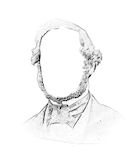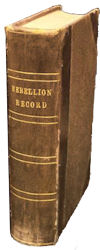
June 10th.—At last venit summa dies et ineluctabile tempus. I had seen as much as might be of the best phase of the great institution—less than I could desire of a most exemplary, kind-hearted, clear-headed, honest man. In the calm of a glorious summer evening we crossed the Father of Waters, waving an adieu to the good friend who stood on the shore, and turning our backs to the home we had left behind us. It was dark when the boat reached Donaldsonville on the opposite “coast.”
I should not be surprised to hear that the founder of. this remarkable city, which once contained the archives of the State, now transferred to Baton Rouge, was a North Briton. There is a simplicity and economy in the plan of the place not unfavorable to that view, but the motives which induced Donaldson to found his Rome on the west of Bayou La Fourche from the Mississippi must be a secret to all time. Much must the worthy Scot have been perplexed by his neighbors, a long-reaching colony of Spanish creoles, who toil not and spin nothing but fishing-nets, and who live better than Solomon, and are probably as well dressed, minus the barbaric pearl and gold of the Hebrew potentate. Take the odd, little, retiring, modest houses which grow in the hollows of Scarborough, add to them the least imposing mansions in the town of Folkstone, cast these broadsown over the surface of the Essex marshes, plant a few trees in front of them, then open a few cafés billard of the camp sort along the main street, and you have done a very good Donaldsonville.
A policeman welcomes us on the landing, and does the honors of the market, which has a beggarly account of empty benches, a Texan bull done into beef, and a coffee-shop. The policeman is a tall, lean, west countryman; his story is simple, and he has it to tell. He was one of Dan Rice’s company—a travelling Astley. He came to Donaldsonville, saw, and was conquered by one of the Spanish beauties, married her, become tavern-keeper, failed, learned French, and is now constable of the parish. There was, however, a weight on his mind. He had studied the matter profoundly, but he was not near the bottom. How did the friends, relatives, and tribe of his wife live? No one could say. They reared chickens, and they caught fish; when there was a pressure on the planters, they turned out to work for 6s. 6d. a-day, but those were rare occasions. The policeman had become quite grey with excogitating the matter, and he had “nary notion how they did it.”
Donaldsonville has done one fine thing. It has furnished two companies of soldiers—all Irishmen—to the wars, and the third is in the course of formation. Not much hedging, ditching, or hard work these times for Paddy! The blacksmith, a huge tower of muscle, claims exemption on the ground that “the divil a bit of him comes from Oireland; he nivir hird af it, barrin’ from the buks he rid,” and is doing his best to remain behind, but popular opinion is against him.
As the steamer could not be up from New Orleans till dawn, it was a relief to saunter through Donaldsonville to see society, which consisted of several gentlemen and various Jews playing games unknown to Hoyle, in oaken bar-rooms flanked by billiard tables. Doctor Cotmann, who had crossed the river to see patients suffering from an attack of euchre, took us round to a little club, where I was introduced to a number of gentlemen, who expressed great pleasure at seeing me, shook hands violently, and walked away; and, finally, melted off into a cloud of mosquitoes by the river bank, into a box prepared for them, which was called a bedroom.
These rooms were built of timber on the stage close by the river. “Why can’t I have one of those rooms?” asked I, pointing to a larger mosquito box. “It is engaged by ladies.” “How do you know?” “Parceque elles ont envoyé leur butin.” It was delicious to meet the French “plunder” for baggage—the old phrase, so nicely rendered—in the mouth of the Mississippi boatman.
Having passed a night of discomfiture with the winged demons of my box, I was aroused by the booming of the steam drum of the boat, dipped my head in water among drowned mosquitoes, and went forth upon the landing. The policeman had just arrived. His eagle eye lighted upon a large flat moored alongside, on the stern of which was inscribed in chalk, “Pork, corn, butter, beef,” &c. Several “spry” citizens were also on the platform. After salutations and compliments, policeman speaks—”When did she come in?” (meaning flat.) First citizen—”In the night, I guess.” Second citizen—”There’s a lot of whisky aboord, too.” Policeman (with pleased surprise)—”Yeu never mean it?” First citizen—”Yes, sir; one hundred and twenty gallons!” Policeman (inspired by patriotism)—”It’s a west-country boat; why don’t the citizens seize it? And whisky rising from 17c. to 35c. a gallon!” Citizens murmur approval, and I feel the whisky part of the cargo is not safe. “Yes, sir,” says citizen three, “they seize all our property at Cairey (Cairo), and I’m making an example of this cargo.”
Further reasons for the seizure were adduced, and it is probable they were as strong as the whisky, which has, no doubt, been drunk long ago on the very purest principles. In course of conversation with the committee of taste which had assembled, it was revealed to me that there was a strict watch kept over those boats which are freighted with whisky forbidden to the slaves, and with principles, when they come from the west country, equally objectionable. “Did you hear, sir, of the chap over at Duncan Kenner’s, as was caught the other day?” “No, sir, what was it?” “Well, sir, he was a man that came here and went over among the niggers at Kenner’s to buy their chickens from them. He was took up, and they found he’d a lot of money about him.” “Well, of course, he had money to buy the chickens.” “Yes, sir, but it looked suspeec-ious. He was a west-country fellow, tew, and he might have been tamperin’ with ’em. Lucky for him he was not taken in the arternoon.” “Why so?” “Because, if the citizens had been drunk, they’d have hung him on the spot.”
The Acadia was now alongside, and in the early morning Donaldsonville receded rapidly into trees and clouds. To bed, and make amends for mosquito visits, and after a long sleep look out again on the scene. It is difficult to believe that we have been going eleven miles an hour against the turbid river, which is of the same appearance as it was below—the same banks, bends, driftwood, and trees. Large timber rafts, navigated by a couple of men, who stood in the shade of a few upright boards, were encountered at long intervals. White egrets and blue herons rose from the marshes. At every landing the whites who came down were in some sort of uniform. There were two blacks placed on board at one of the landings in irons—captured runaways—and very miserable they looked at the thought of being restored to the bosom of the patriarchal family from which they had, no doubt, so prodigally eloped. I fear the fatted calfskin would be applied to their backs.






